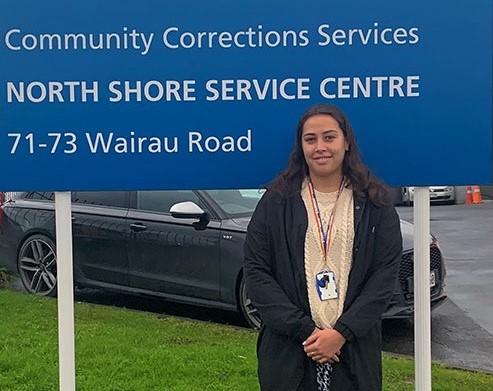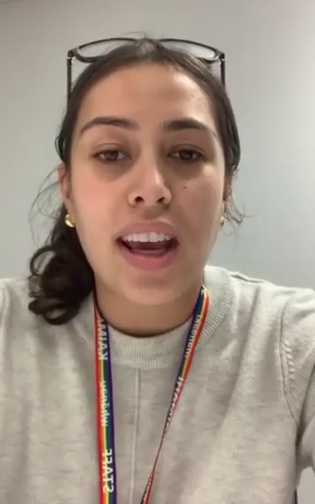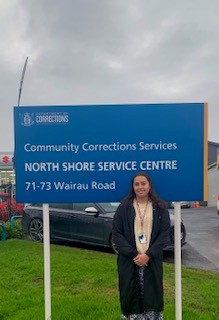What on earth is it like to be a probation officer?

The dream of becoming a police detective led Georgia Fui to AUT to study criminology and conflict resolution. However, as she delved further into her degree, she started to question her career choice. Did she really want to be out on the streets catching people breaking the law? If not, then what else could she do?
Probation officer was not top of her list – in fact it was not even on her list! Yet for the last year Georgia has been working for Community Probation Services - and she's loving the challenge, the people and the environment.
Unsure what to do when she couldn't get a work placement with the police, criminology student Georgia Fui followed up a suggestion to look at Department of Corrections’ Community Probation Services. There she found herself helping people sentenced to community based sentences, and was quickly drawn to the work.
“I love the interactions I have - and not just with people in our care but their families as well. I love the different support Probation Services offer that can help create positive change in a person’s life.”
Georgia did her work placement at North Shore Community Corrections where she observed all aspects of Community Corrections roles, including probation officers, community work and the employment education training team. Two weeks into her placement she got offered a fixed term contract as a probation officer while continuing her study – and she grabbed the opportunity.
“I was excited and but really taken aback and thought ‘oh god, can I do this?’. Then I realised this is something I’m enjoying and although it was not what I’d been thinking about doing when I started my degree, I really wanted to give it a go.”
A year later Georgia remains in the department and has recently gained a permanent position with Community Probation.
Building confidence
A shy person by nature, Georgia says when she got the job offer she knew she had to front up with confidence if she wanted to be successful.
“I just flipped the switch.  I’m naturally quite shy but as I learnt more and more about the job my confidence grew with each new learning and the majority of my work now comes naturally without a second thought. However, no day is the same and I continue to learn new things each day which keeps me constantly interested in the job.”
I’m naturally quite shy but as I learnt more and more about the job my confidence grew with each new learning and the majority of my work now comes naturally without a second thought. However, no day is the same and I continue to learn new things each day which keeps me constantly interested in the job.”
Initially, as a 21 year old, Georgia felt wary about having to visit people at home, but now enjoys the opportunity it offers to see people in their own environment and to build relationships with them and their whanau.
“Through hui we gather everyone together to understand what we’re doing and why. Families are usually really good and happy to give extra help once they see that what we’re doing will help their loved ones.”
First role – pre sentencing reports
Georgia's first role was writing pre-sentencing reports to the Courts Provision of Advice (PAC) team. It’s quite a responsibility, involving interviewing people who have been convicted of offences to provide judges the background information they need to decide the most appropriate sentence. These reports take into account the offending as well as the person's mental, physical, financial, emotional, cultural, social and rehabilitative needs.
“During interviews we discuss the circumstances and barriers that may affect their compliance with probation, possible sentence conditions and programmes that may benefit their lives and assist them to remain offence free,” says Georgia.
If the judge is seeking electronic monitoring Georgia has to assess whether it would work in practical terms by going to their home, talking to the family and checking if the environment/property is okay for electronic monitoring. “Then I’d write a report and recommendations.”
Sentence management
After 10 months in the PAC team, Georgia is now in the sentence management team. She started off with a small case load that has increased over time. “I now manage 30 people, who range in nationalities and age, and are undertaking a good mix of sentences.”
She usually sees four people each day, then writes up case notes, covering what was discussed in the interview and what action to take. She will also occasionally write reports for referrals or about non-compliance if a person has failed to meet their sentence obligation
Community based sentences
Individuals on probation are sentenced to community based sentences such as supervision, intensive supervision, community detention, home detention or released from prison on parole or released on conditions orders. Some are on Returning Offender Orders after getting sent to NZ from Australia.
“I had no idea what all these terms meant when I started, but now it is all just my everyday language,” laughs Georgia.
While the community based sentences all carry different restrictions and obligations for those serving the sentence, they all must report to their allocated probation officer to discuss their progress on sentence or any changes in circumstances.
Conversations can be tricky. For example if a condition in their sentence is to not use alcohol or drugs, then Georgia has to assess whether this has occurred by asking directly or assessing their presentation.
“It’s not to catch them out so much as hold them accountable and refer them to rehabilitative supports if they need. So the job is about managing the sentence set by the Court and making sure their risk isn’t escalating.”
Helpful academic papers
She finds she draws on knowledge from a number of AUT papers, particularly from her Conflict Resolution minor.
“I learned ways to deal with conflict between people and be more of the mediator. I’ve learned how to talk to people and how to distinguish between direct and indirect conflict. Now, if someone gets angry with me, I usually find it is the system they are angry with but I’m the convenient one to take that anger out on because I’m the face of the organisation and the point of contact. So I try and mediate around that. These skills are just now part of what I do.”
She also has found two other papers very useful; Crime and Deviancy, which taught her concepts like social contract theory and learned behaviours, and Prisons and Punishment which she describes as a good background paper about why NZ uses punishment and the justice system.
Desirable skills when applying for roles
Georgia says writing skills, computer skills and interpersonal skills are essential.
Cultural intelligence is also very important, she adds, because at job interviews you are always asked how you would deal with different ethnicities and cultures.
“I was able to draw on group work and talk about doing tasks together and learning to talk to lots of other people I didn’t know. It really helps having that type of example to draw on.”
She encourages students to make the most of everything offered through university.
“I loved AUT. It was really good for me, but I did muck around for the first two years,” admits Georgia.
“I had a few C+ grades initially but once I knuckled down I improved a lot. Employers were really interested in the Māori papers I did and in my minor in conflict resolution. I believe these really helped me.”
Great pathway
Georgia is loving her career.
"It is really fulfilling supporting people through rehabilitation and makes me reflect on how lucky I've been to have support of family and friends and a good education.
It is a fantastic job and I'm so glad my work experience lead me to this career because I wouldn't have given it a look if I hadn't had to find a work placement.”
Tips
- Finding something specific that you can see yourself doing and go for it. But also set up a Plan B by thinking about what else you could be good at and how else you could apply your skills in another role.
- Apply for everything you can with student placement. You never know what will come through.
Want to know more?
Find out more about Criminology and Social Sciences through our Future Career Sheets
CVs/Cover letters
- 7 Tips on creating a great CV
- Personal Statement? Career Objective? What?
- Why bother with LinkedIn?
- Why bother to write a cover letter?
Job search skills
Career advice
- Bringing passion into the mix
- Don't let rejection end your dream
- Employability Skills - how to figure them out!